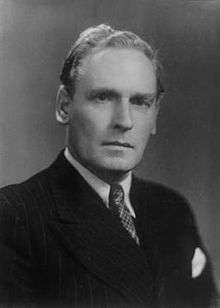Cyril Asquith, Baron Asquith of Bishopstone
| The Right Honourable The Lord Asquith of Bishopstone PC | |
|---|---|
 | |
| Lord of Appeal in Ordinary | |
|
In office 1951–1954 | |
| Personal details | |
| Born |
5 February 1890 London, England |
| Died |
24 August 1954 (aged 64) London, England |
Cyril Asquith, Baron Asquith of Bishopstone, PC (5 February 1890 – 24 August 1954) was an English law lord.
Early life and career
Cyril Asquith was the fourth son and youngest child of H. H. Asquith, later Prime Minister and subsequently Earl of Oxford and Asquith, from his first marriage to Helen Kelsall Melland.
He was educated at Summer Fields School, Winchester College and Balliol College, Oxford, where he was a foundation scholar. Like his father and his brother, Raymond. Asquith obtained Firsts in Classical Moderations in 1911 and in literae humaniores in 1913. At Oxford he won the Hertford, Craven and Ireland prizes, and was elected Eldon scholar. In 1913 he was elected a fellow of Magdalen College, Oxford.
During the First World War he served in the 16th Battalion (Queen's Westminster Rifles), London Regiment, gaining the rank of captain. In September 1917 he joined the Ministry of Munitions delegation on the British War Mission to the United States, and served for a time in America.[1]
He was called to the bar at the Inner Temple in 1920, and was a pupil in the chambers of William Jowitt who, as Lord Chancellor, recommended Asquith's promotions to the Court of Appeal and the House of Lords. In 1936 he was elected to serve on the Liberal Party Council.[2] He took silk in 1936, was appointed Recorder of Salisbury in 1937, and was elected Bencher of the Inner Temple in 1939.
Judicial career
Asquith was appointed as a Justice of the King's Bench Division of the High Court in 1938, receiving the customary knighthood.[3] His appointment caused some surprise at the bar, and the Lord Chief Justice, Lord Hewart, felt that he had not been properly consulted about the appointment. In 1946, Asquith was appointed a Lord Justice of Appeal and was sworn into the Privy Council.
On 23 April 1951 he was appointed a Lord of Appeal in Ordinary as Baron Asquith of Bishopstone, of Bishopstone in the County of Sussex.[4] He held office until his death in 1954.
Asquith was conservative as a judge. Famously, in Candler v. Crane, Christmas & Co. (1951), in response to Lord Denning's dissent that "there were the timorous souls who were fearful of allowing a new cause of action", Asquith wrote that "If this relegates me to the company of timorous souls, I must face that consequence with such fortitude as I can command".
In October 1951, he was unexpectedly offered the Lord Chancellorship by Winston Churchill, but declined the offer.
Family
He married Anne Stephanie Pollock (27 April 1896 – 1964), daughter of Sir Adrian Donald Wilde Pollock, of the Pollock Baronets, on 12 February 1918. They had four children:[5]
- Hon. Luke Asquith, married and had:
- Anne Asquith, married on 2 September 1989 to The Hon. Roderick Alexander "Rory" Cavendish, 8th Baron Waterpark (b. 10 October 1959), educated at Harrow School, Harrow on the Hill, London, and at Vassar College, Poughkeepsie, New York[6]
- Hon. Jane Asquith
- Hon. Frances Rose Asquith (b. 1925), known as Rose, married in 1951 John Frederick Eustace Stephenson (1910–1998)
- Hon. Paul Asquith (4 January 1927 - 1984), married, firstly, on 18 July 1953 and divorced in 1963 Helena Mary Bridgeman (b. 2 November 1932), daughter of Brigadier The Hon. Geoffrey John Orlando Bridgeman and Mary Meriel Gertrude Talbot; and, secondly, on 16 July 1963, Cynthia Anne Carew Pole (b. 11 January 1933), daughter of Sir John Gawen Carew Pole, 12th Bt. and Cynthia Mary Burns. He had issue by his first marriage:
- Mary Asquith (b. 28 July 1954)
- Jonathan Paul Asquith (b. 28 September 1956), married on 23 June 1984 Sarah Ann Negretti (b. 29 September 1959), daughter of Peter Noel Negretti and Ann Caroline Eden, living in 2003 at 8 Colinette Road, London[7]
Arms
 |
|
References
- ↑ Who’s Who in the British War Mission in the United States of America, 2nd Ed; Edward J. Clode, 1918: 3
- ↑ The Liberal Magazine, 1936
- ↑ "No. 34498". The London Gazette. 1 April 1938. p. 2148.
- ↑ "No. 39212". The London Gazette. 24 April 1951. p. 2327.
- ↑ L. G. Pine, The New Extinct Peerage 1884-1971: Containing Extinct, Abeyant, Dormant and Suspended Peerages With Genealogies and Arms (London, U.K.: Heraldry Today, 1972), page 16
- ↑ Charles Mosley, editor, Burke's Peerage, Baronetage & Knightage, 107th edition, 3 volumes (Wilmington, Delaware, U.S.A.: Burke's Peerage (Genealogical Books) Ltd, 2003), volume 3, page 4095
- ↑ Charles Mosley, editor, Burke's Peerage, Baronetage & Knightage, 107th edition, 3 volumes (Wilmington, Delaware, U.S.A.: Burke's Peerage (Genealogical Books) Ltd, 2003), volume 1, page 1272.
- ↑ http://www.cracroftspeerage.co.uk/online/content/asquith1951.htm